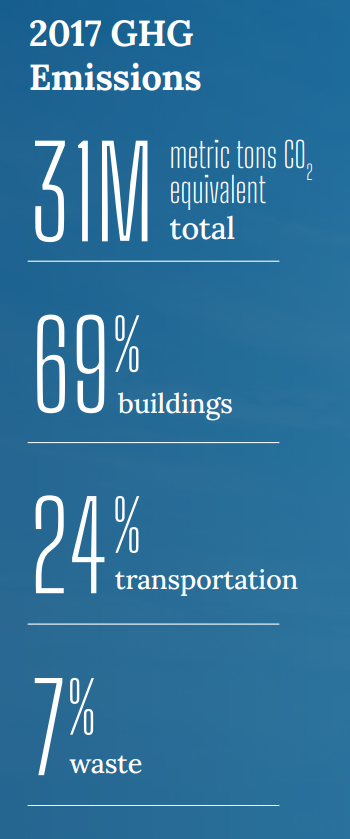Electrify Chicago
An independent tool for viewing City of Chicago building data
According to the
2022 Chicago Climate Action Plan,
69% of Chicago's emissions come from buildings, making
building emissions our biggest challenge and our biggest opportunity as a city
to tackle climate change. At Electrify Chicago, we showcase building performance using
publicly available data supplemented by community-submitted photographs and building
owners.
Start by looking at Chicago's buildings with the highest greenhouse gas intensity i.e. emissions per square foot. Large, efficient, buildings can perform much better than very inefficient small buildings on this metric.
New Article
📰 $30 Million In Missed Fines
The City Of Chicago failed to collect $30 million in potential fines from the building benchmarking ordinance, reducing transparency and accountability.
Legislative update! 🎉
As of late January 2024, legislation is being introduced to require new use more efficient forms of water and space heating, via the Clean And Affordable Buildings Ordinance (CABO), which will reduce the number of highly polluting and inefficient buildings that end up on this site.
If you're in Chicago,
write to your alderman to support the CABO!
Chicago Buildings by Greenhouse Gas Intensity
Note: Data includes large Chicago buildings with data from 2022, unless explicitly stated otherwise.
Note: This data only includes buildings whose emissions are reported
under the
Chicago Energy Benchmarking Ordinance. According to the City “As of 2016,
this list includes all commercial, institutional, and residential buildings larger than
50,000 square feet.” This dataset is also then filtered to only buildings with
reported emissions > 1,000 metric tons CO2 equivalent.
The latest year of data is from 2022, but we update the site regularly when new data is available, and some buildings may have failed to report that year, and only have older data available.
| Property Name / address | Primary Property Type |
Greenhouse Gas Intensity (kg CO2 eq./sqft) |
Total Greenhouse Emissions (metric tons CO2 eq.) |
|---|---|---|---|
|
The Newport CA
🚩
4800 S Chicago Beach Dr
| Multifamily Housing | 6.4 kg/sqft
Lowest 49%
| 4,918 tons
Highest 7%
|
|
Brownstone Condominium
1440 N STATE PKWY
| Multifamily Housing | 6.4 kg/sqft
Lowest 49%
| 637 tons
Lowest 36%
|
|
5100 Marine Drive Condominium Association
5100 N Marine Dr
| Multifamily Housing | 6.4 kg/sqft
Lowest 49%
| 1,765 tons
Highest 26%
|
|
Lakeside Tower Condo Association
1600 S Indiana Ave
| Multifamily Housing | 6.4 kg/sqft
Lowest 49%
| 1,564 tons
Highest 30%
|
|
1464 S Michigan Ave
1464 S Michigan Ave
| Multifamily Housing | 6.4 kg/sqft
Lowest 49%
| 1,688 tons
Highest 28%
|
|
Drake Tower Apartments
179 E LAKESHORE DR
| Multifamily Housing | 6.4 kg/sqft
Lowest 49%
| 1,581 tons
Highest 30%
|
|
University Park Condominium Association
1451 E 55th St
| Multifamily Housing | 6.4 kg/sqft
Lowest 49%
| 3,429 tons
Highest 11%
|
|
The Westgate
804 812 W VAN BUREN ST
| Multifamily Housing | 6.4 kg/sqft
Lowest 49%
| 425 tons
Lowest 19%
|
|
3300 3306 W DIVERSEY AVE
3300 3306 W DIVERSEY AVE
| Multifamily Housing | 6.4 kg/sqft
Lowest 49%
| 1,153 tons
Highest 40%
|
|
River North Park
320 W Illinois St
| Multifamily Housing | 6.4 kg/sqft
Lowest 49%
| 2,950 tons
Highest 14%
|
|
Belmont Tower Apartments
510 W Belmont Ave
| Multifamily Housing | 6.4 kg/sqft
Lowest 49%
| 1,788 tons
Highest 26%
|
|
Minnie Ripperton Apts
(CHA)
4250 S Princeton Ave
| Multifamily Housing | 6.4 kg/sqft
Lowest 49%
| 1,343 tons
Highest 35%
|
|
Lidia Puchinska Apartments
838 N Noble St
| Multifamily Housing | 6.4 kg/sqft
Lowest 49%
| 1,714 tons
Highest 27%
|
|
7301 N SHERIDAN RD
7301 N SHERIDAN RD
| Multifamily Housing | 6.4 kg/sqft
Lowest 49%
| 479 tons
Lowest 24%
|
|
1040 W Randolph St
1040 W Randolph St
| Office | 6.4 kg/sqft
Lowest 49%
| 357 tons
Lowest 13%
|
Data Source:
Chicago Energy Benchmarking Data
